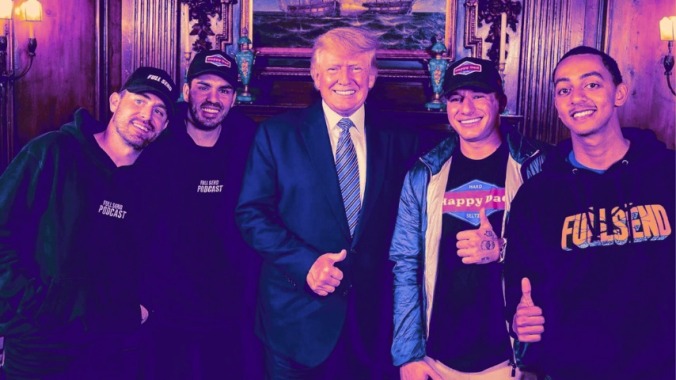Inside the Network of Manosphere Influencers Who Have Pushed Young Men to the Right
Thanks to social media algorithms, content about apolitical interests like weightlifting, video games, MMA fighting, and dating has become a pipeline to the right, as we saw on Election Day.
In DepthMediaPolitics
The day after Election Day, calls to the Trevor Project’s crisis services hotline for LGBTQ youth surged by 200%; online searches for abortion pills and emergency contraception skyrocketed, too. Queer youth, women, and girls were clearly concerned about what a second Trump presidency meant for their safety and their futures. But the country has been largely apathetic to their fears.
Instead, we’re being called to consider young men’s suffering—real and imagined—and the insidious forces that seemed to shift this demographic to the right. A sampling of post-election headlines includes, “We Asked Young Men Why They Voted for Donald Trump—Here’s What They Said,” “The ‘Lost Boys’ of Gen Z: how Trump won the hearts of alienated young men,” “What’s the Matter with Young Male Voters?” and “Trump Offered Men Something That Democrats Never Could.” Of course, Jezebel is now adding to that list, but what’s missing from some of these stories is the manosphere as an increasingly powerful political arm.
Exit polls show Trump received a larger proportion of voters under 30 than any Republican presidential candidate since 2008. In 2020, Joe Biden beat Trump by 11 points among men under 30. Last week, Trump beat Kamala Harris by two points. (Among young white men without college degrees, he beat Harris 56% to 40%.) Some of this should be taken with a grain of salt: Youth turnout dropped sharply from 2020, so these stats offer an incomplete snapshot of an entire generation’s views. But, as journalists, organizers, and the Democratic Party scramble for answers, one concern that’s come to the forefront is the manosphere—a fast-growing, unrepentantly hateful community of men’s lifestyle influencers, podcasters, and media personalities who glorify and preach misogyny to a new generation of young men.
Think: serially accused rapist and human trafficker Andrew Tate, hate speech-platforming Twitch streamer Adin Ross, or misogynist streamer Sneako, who once slapped a woman on camera as a “prank.” There’s also TikTok star Bryce Hall, who joined Trump on the campaign trail about a year after collaborating with proud neo-Nazis, including Sneako. One video from December 2023 shows Sneako laughing as he’s approached by young fans who yell, “Fuck the women” and “All gays can die.” He half-jokingly asks the camera, “What have I done?”
On Election Night, Trump handed the mic to UFC President Dana White (who, like Sneako, also slapped a woman on camera) at his victory party, and White directly thanked Ross, as well as the Nelk Boys and Theo Von, more popular manosphere influencers and podcasters who also supported Trump’s campaign. Over the last several months, Trump made numerous appearances on their shows and streams and hosted them at his rallies. And, because this seems to have worked, those who didn’t see Trump’s victory coming are now trying to understand this chilling sphere of influence that’s seemingly been radicalizing young men right under our noses.
>Dana White speaking at Donald Trump USA presidential victory ceremony
>shouts out Nelk Boys and Adin Ross
It’s a South Park episode, but real life. I almost can’t believe I just heard that. Total parody. Brain rot paraded at one of the highest levels of government. https://t.co/1N4wY8tqRd
— LAMO (@lookatmyopinion) November 6, 2024
-

-

-

-

-

-

-

-

-

-

-

-

-

-

-

-

-

-

-

-

-

-

-

-

-

-

-

-

-

-

-

-

-

-

-

-

-

-

-

-








































